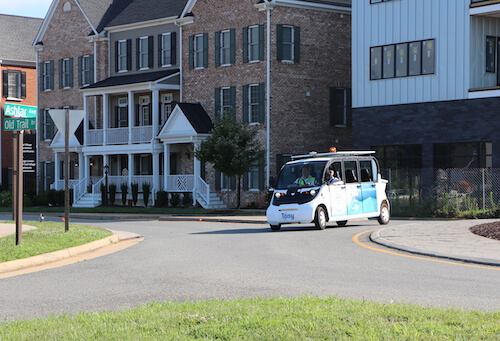
Two autonomous First Transit shuttles will soon begin transporting soldiers within the Fort Carson Army installation in Colorado while also collecting operational data during the trips.
US Ignite, a nonprofit working to accelerate the smart community movement, chose Cincinnati-based First Transit, in partnership with Crozet, Virginia, based Perrone Robotics, to provide the autonomous shuttles for the year-long project. The electric Polaris GEM autonomous shuttles will be equipped with Perrone’s TONY (TO Navigate You) autonomy kit, which supports level 5 autonomous capability. The shuttle deployments represent phase one of the Fort Carson Smart Transportation Testbed.
“The shuttle will provide transit for personnel from the Army barracks to the mess hall, places like that,” Perrone Robotics Founder/CEO Paul Perrone said. “It’s a great application for us. There are a lot of smart cities and smart residential and commercial center developments popping up asking for these kinds of smaller shuttles.”
The $4 million program aims to test autonomous vehicles and sensor-based technologies to see how they can reduce military transportation costs, deliver faster services, improve public safety and enhance the lives of soldiers and their families, according to the US Ignite website. The goal is to ultimately develop a comprehensive implementation plan to scale autonomous vehicle technologies at Fort Carson and other military bases.
First Transit is already operating one shuttle with the second being shipped soon, Perrone said. Once deployed, the shuttles will extend the hours of service to key destinations beyond what traditional shuttles offer. The shuttles are expected to start carrying passengers in mid-September, with precautions implemented to protect against COVID-19.
Other elements of the Testbed
As the program moves beyond phase one, the research team will explore on and off-post automated delivery vehicles and shuttles.
The initiative will also focus on transportation planning and data analytics, assessment and modeling for future deployments. Roadside cameras will be installed and connected to a dedicated wireless network along the route to capture information about the vehicles and how pedestrians act around them.
The program also includes a sophisticated data sharing initiative between Fort Carson and Colorado Springs, according to a news release. Information from Fort Carson will be linked to data from sensors and mapping systems in Colorado Springs. Researchers will apply analytics to these datasets to improve safety and services, and eventually develop machine learning models that prioritize transportation resources based on usage rates and community needs.
“We are proud to bring our extensive shared autonomous vehicle (SAV) experience to the Fort Carson Smart Transportation Testbed initiative,” said Brad Thomas, president of First Transit, according to the release. “This partnership allows ongoing data and information to be collected in order to continue to enhance the passenger experience on AVs.”
The program is a joint effort of US Ignite, Fort Carson, the city of Colorado Springs, and the University of Colorado’s Research and Engineering Center for Unmanned Vehicles (RECUV). The U.S. Army Engineer Research and Development Center (ERDC) is funding and managing the project.
Perrone projects
The GEM autonomous shuttles being tested in Fort Carson were also deployed in a last mile study in Virginia’s Albemarle County last year, Perrone said. Perrone Robotics worked with the county to complete a three-month trial, offering free rides on the Autonomous Vehicle, Neighborhood Use (AVNU) shuttle. AVNU drove fully autonomously without incident, carrying more than 750 passengers 530 miles. A safety operator was on board for the trial, though the operator never had to intervene.
The fully autonomous TONY retrofit kit is vehicle agnostic, meaning it can be used in transit vans, trucks, buses and shuttles. Other deployments include a transit van that’s being tested by the Jacksonville Transit Authority, autonomous yard trucks picking up and dropping of trailers for a logistics company, and mining trucks operating for Liebherr. The TONY platform is in more than 30 different autonomous vehicles.

